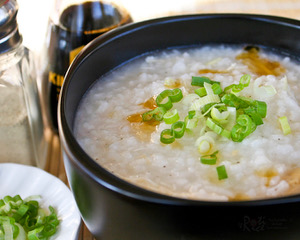Article by Allie Franczak, RAc
Rice congee is a traditional and highly nourishing Chinese breakfast used for healing since the Han Dynasty (206 BCE).
For those not familiar with congee, it is a rice porridge made with 1 cup of jasmine rice and between 6-9 cups of water or stock (depending on your preference for consistency). The rice is cooked until it breaks down into a porridge (approximately 40 minutes – 1 hour on stovetop or overnight in a slow cooker). I like to use chicken stock or bone broth for flavour. Think oatmeal but savoury and made with rice instead of oats.
Congee is prescribed when Spleen Qi – the energy that propels digestion and the production of qi and blood – needs to be replenished. It is great for those with chronic illness, digestive issues (diarrhea or constipation), postpartum or simply for those who are stressed or overworked.
This is also a wonderful breakfast for those who skip breakfast because they don’t have time or aren’t hungry first thing in the morning. In Chinese diet therapy, we encourage patients to eat a small and simple meal first thing in the morning to get the digestive system moving. Rice congee is easy to digest and simple in flavour which makes it a great option for people who tend to skip breakfast.

Why is congee so healing? It is particularly beneficial for the stomach and intestines as it is gentle and breaks down easily. Traditionally, chopped green onion is added after cooking as well as freshly-grated ginger. This is hugely supportive to the Spleen Qi and also helps to warm the Kidney Yang. It is wonderful for the digestive system, helps combat fatigue and boosts immunity. It is so nourishing because the warmth of this meal supports normal Spleen function even in times when the Kidney’s may be weakened.
Modifications:
Any congee will strengthen Spleen qi and digestion, but depending on your taste and goals you may consider adding in any of the following:
- Vegetables such as spinach and boy choy will support a healthy liver function
- Eggs, meat, dark coloured berries or beets will build blood
- Cardamon, ginger, and cinnamon will support the lungs, clear phlegm and aid digestion
- Nuts and seeds will nourish yin, generate fluids, and helps with symptoms such as hot flashes or dry cough
Try starting your winter mornings with this simple yet nourishing meal. You can make a large batch and re-heat in the mornings on the stove top by adding a bit of water or stock.
You’ll be amazed at how well your digestive system responds by adding this into your morning routine.

